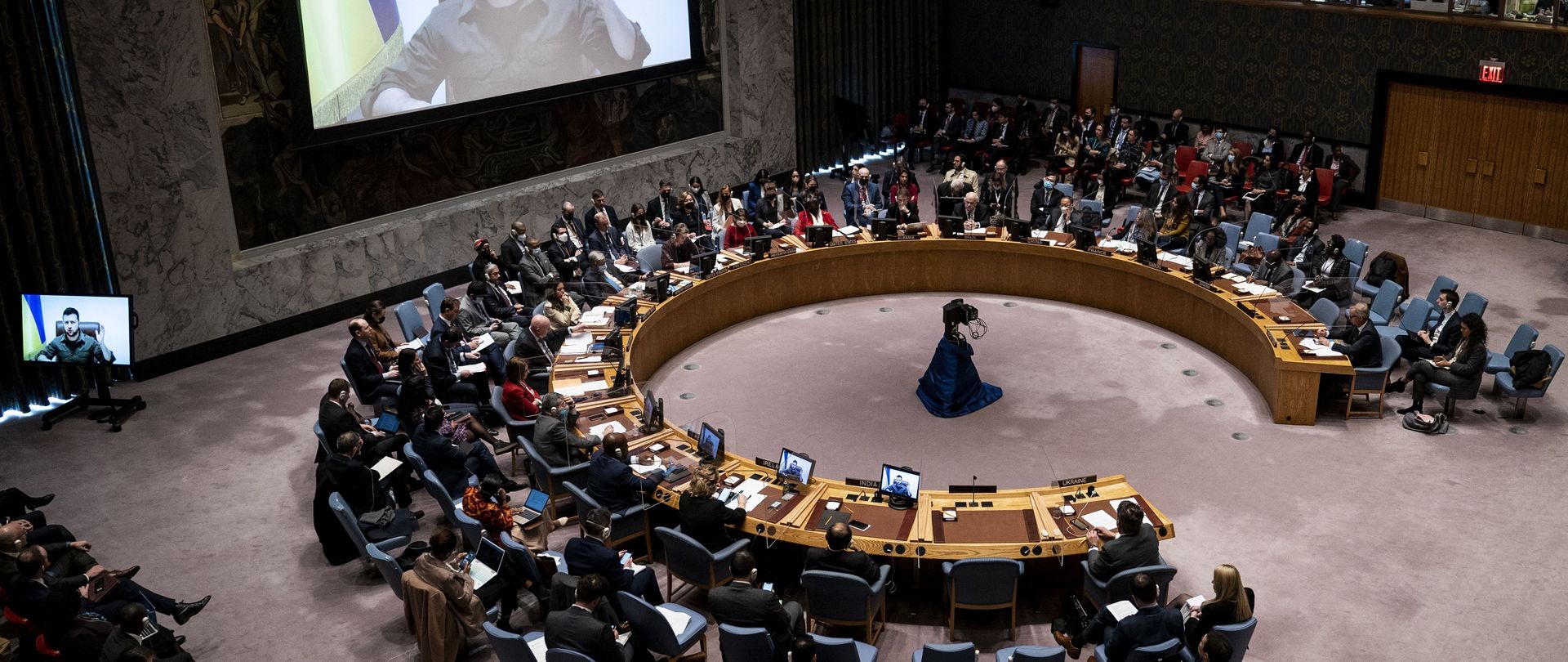
© picture alliance / ASSOCIATED PRESS | John Minchillo
Global impact
Russia’s war against Ukraine has massive global repercussions and is fuelling the polarisation of the international system. The war itself has become increasingly internationalised since it began. On the one hand, the West is deeply committed to Ukraine, as illustrated by the military, political, and economic support it has provided. On the other hand, a group of supporters has also emerged around Russia, which is buying weapons from Iran and North Korea. Meanwhile, North Korean soldiers are now directly involved in the fighting. China and other countries are helping Russia to evade Western sanctions by allowing it to continue buying vital goods for its defence industry.
Russia’s war against Ukraine is having a destabilising impact on other conflict regions. In the Middle East, Moscow sided with Hamas following its terrorist attack on Israel in October 2023. As Moscow’s dependence on Iranian arms supplies grows, Russia is no longer able to exert a moderating influence on Tehran and its allied terrorist groups – even if it were willing to do so. Military cooperation with North Korea strengthens the North Korean ruler, Kim Jong-un, and has a visibly negative impact on stability on the North Korean peninsula. Tehran and Pyongyang can now more easily gain access to Russian nuclear weapons technology.
The war continues to threaten global food security and international energy markets. The disruption of economic relations between Russia and the West as well as Western sanctions have changed international trade. Russia is seeking to strengthen international structures in places where the West is absent. This is one of the factors seriously weakening the UN and other institutions of the post–World War international order.
Contact
-
Dr. agr. Bettina Rudloff
EU/Europe (Senior Associate)
Thematic working group economic and technological transformations (Co-Chair)
Areas of Expertise
- Agriculture policy
- Crisis management
- Development cooperation
- EU foreign trade policy
- Foreign trade policy
- Global nutrition
-
Dr. Raphael Bossong
EU/Europe (Deputy Head of Research Division)
phone:+49 30 88007- 368
Research Cluster Cybersecurity and Digital Policy
Areas of Expertise
- Crisis management
- European Union
- Justice and Home Affairs in the EU
- Migration policy
- Political system of the European Union
- Terrorism
-

-
Dr. phil. Nadine Godehardt
Asia (Senior Associate)
SWP Brussels (Senior Associate)
-
Dr Janis Kluge
Eastern Europe, Eurasia (Senior Associate)
Eastern Europe, Eurasia (Deputy Head of Research Division)
Areas of Expertise
- Russian Federation
- Population trends
- Trade
-
Dr. phil. Margarete Klein
Eastern Europe, Eurasia (Head of Research Division)
phone:+49 30 88007- 256
Areas of Expertise
- Russian Federation
- Defence and security policy / Armed forces
Publications
-
The Political Transition in Syria: Regional and International Interests
SWP Comment 2025/C 11, 18.03.2025, 8 Pagesdoi:10.18449/2025C11
-
The Fall of the Assad Regime: Regional and International Power Shifts
SWP Comment 2025/C 09, 25.02.2025, 8 Pagesdoi:10.18449/2025C09
-
Reconfigurations in the Post-Soviet South
Dynamics and Change in Eurasia
SWP Comment 2024/C 58, 19.12.2024, 7 Pagesdoi:10.18449/2024C58
-
Belarus: Sovereignty under Threat
Impacts of the Russian War against Ukraine
SWP Comment 2024/C 22, 12.06.2024, 8 Pagesdoi:10.18449/2024C22
-
Russia-China Economic Relations
Moscow’s Road to Economic Dependence
SWP Research Paper 2024/RP 06, 24.05.2024, 39 Pagesdoi:10.18449/2024RP06
-
The Black Sea as Mare Clausum
Turkey’s special role in the regional security architecture
SWP Comment 2023/C 33, 21.06.2023, 7 Pagesdoi:10.18449/2023C33